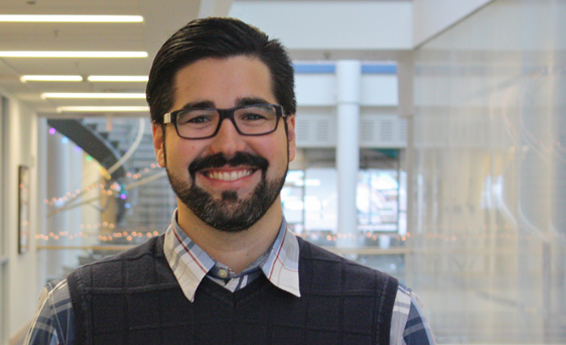Héctor J. García Selected for Bouchet Graduate Honor Society

 Enlarge
Enlarge
Recent alumnus Dr. Héctor J. García (CSE PhD 2013) has been selected for induction into the Bouchet Graduate Honor Society. The purpose of the Bouchet Society is to recognize outstanding scholarly achievement and promote diversity and excellence in doctoral education and the professoriate. The official induction ceremony and related activities for the 2014 class of inductees from around the country will take place at Yale University on March 28–29, 2014.
Named for the first African American doctoral recipient in the United States (Physics, Yale University, 1876), the Edward Alexander Bouchet Graduate Honor Society recognizes outstanding scholarly achievement and promotes diversity and excellence in doctoral education and the professoriate. The Bouchet Society is a network of preeminent scholars who exemplify academic and personal excellence, foster environments of support, and serve as examples of scholarship, leadership, character, service and advocacy for students who have been traditionally underrepresented in the academy. The U-M Bouchet Society is committed to intellectual excellence and interdisciplinary work, with the additional goal of using this knowledge in the service of society.
The national charter for the Society was inaugurated by Yale University and Howard University on September 15, 2005, in commemoration of Bouchet’s birthday. Since 2005, Washington University, Georgetown University, Cornell University, and the Rackham Graduate School at the University of Michigan have been added to the list of institutions with a Bouchet Society on their campuses.
Dr. García’s research goal at Michigan has been to design efficient tools that identify and analyze potential advantages and pitfalls in emergent computing technologies such as quantum computers. In order to better engineer such devices, it is important to obtain simulation-based studies that help understand exactly how they work and what their computational limitations are. As part of his PhD research, he has designed a new quantum-circuit simulation technique that promises to simulate a broader class of large quantum circuits that is currently beyond the capabilities of current state-of-the-art simulators. In contrast to other simulation techniques, which are hard to parallelize, his technique is inherently parallel and thus can take advantage of highly-efficient distributed computing frameworks.
Dr. García is working as a postdoctoral researcher at CSE with Prof. Igor Markov in the Quantum Computing Group. He will be teaching EECS 281, Data Structures and Algorithms, and EECS 183, Elementary Programming Concepts, in Winter 2014.
 MENU
MENU 
